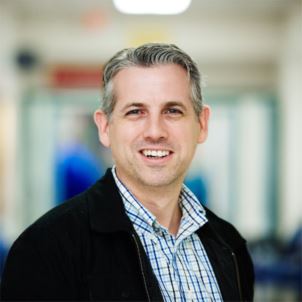Member spotlight
Steve Mathias, BC Integrated Youth Services Initiative
We love to shine the spotlight on the brilliant work of our members – amazing people who are improving the mental health and wellbeing of young people across the world. This is a great way to celebrate their important work as well as sharing new and different ways of working.
Here we catch up with Steve Mathias, the Executive Director of BC Integrated Youth Services Initiative, in Canada.
How would you describe yourself in just one sentence?
I am someone very committed to their family and our family values and this motivates me in my work to transform health services for young people.
How does an integrated youth service centre differ from traditional practice?
Unlike traditional practice, this model doesn’t just focus on one area of support, such as mental health, but brings together services based on what each young person needs.
When a young person first walks into an integrated youth service centre they may be going for help for one concern. However, when the young person fills out the intake it may become apparent the young person may benefit from other supports also available at the centre. The team then works with the young person to determine together what type of service and support they want.
We often hear the frustration of young people and their families, of the challenge of trying to navigate the system and having to repeat their stories over and over. This model helps remove barriers and the need for young people and their families to navigate an array of services themselves.
What improvements have you seen for the young people attending your centre?
We see incredible transformations at the centre as youth work with the team to receive the help they need to deal with whatever they are seeking support for. The model is about empowering young people with the right care, tools and strategies to thrive in life. We don’t want young people to just have to cope, we want to help them live full, meaningful lives and reach their full potential. The team not only helps young people deal with their mental health concerns, but also helps them with education, employment or finding safe housing. They also provide peer supports, recreation programs and opportunities to participate at the centre through the Youth Advisory Council. It is inspiring to see how much the young people grow and flourish when they are empowered with the right support.
What are you currently most excited about in the youth mental health space?
What really excites me is the growing voice of young people and families. It is getting louder and stronger every day, and it is because of that voice we will truly see impactful change. We are seeing more and more young people and families involved, and even taking leading roles, in all areas of the youth mental health space. Empowering them to have a voice empowers us all to make a difference.
How do you take care of your own mental health?
Killer morning workouts and lots of high-fives. But most of all, my kids are the most amazing little people and there is so much laughter in our house that it's hard to take life too seriously.
Read more about Steve's work at:
Nicola Byrom, Student Minds
Here we catch up with Nicola Byrom, the founder of Student Minds in the UK.
How would you describe yourself in just one sentence?
A psychologist enjoying the opportunity to work at a grass roots level to try to achieve systemic change.
What is Student Minds?
Student Minds is the UK's student mental health charity. We want students to have the skills, knowledge and confidence to talk about their mental health and look out for their peers. We believe in peer support and deliver research-driven training and supervision to equip students to bring about positive change on their campuses through campaigning and facilitating peer support projects.
Why did you start Student Minds?
I started Student Minds following my own experience with mental health difficulties. When I first experienced difficulties, some 15 years ago, the patient centred approach felt like a novel, and sometimes foreign, concept. I learnt, with time, that talking openly about my mental health helped; acceptance from peers and the support of friends made an enormous difference. I appreciate the many individual experts who helped me learn to manage my mental health, but I passionately believe that the better support for mental health requires a normalisation of all conversations around mental health. I've tried to use my experiences, through Student Minds, to create space for students to find acceptance from peers and have the opportunity to talk openly about their mental health.
What is your most exciting project at the moment?
We have been working on a campaign called Look After Your Mate, initiated by Rosanna Hardwick. Research in the UK indicates that 75% of students experiencing mental health difficulties will turn to their friends for support. Often friends are the first point of contact and provide the largest proportion of support. The campaign includes a workshop to give students skills to support a friend, including a short and simple introduction to mental health and some tips for supporting a friend through difficulties. We introduce students to listening skills and encourage them to think about how they and their friend may benefit from boundaries. The workshop has now been run in 10's of universities across the UK as we roll out a national train-the-trainer programme.
How do you take care of your own mental health?
I admit that I'm not always good at this. I keep an allotment and find that walking and gardening helps me manage stress and lifts my mood.
Connect with Student Minds:











